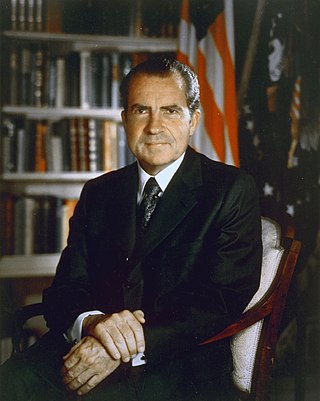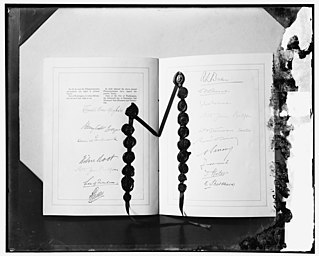Regime change is the partly forcible or coercive replacement of one government regime with another. Regime change may replace all or part of the state's most critical leadership system, administrative apparatus, or bureaucracy. Regime change may occur through domestic processes, such as revolution, coup, or reconstruction of government following state failure or civil war. It can also be imposed on a country by foreign actors through invasion, overt or covert interventions, or coercive diplomacy. Regime change may entail the construction of new institutions, the restoration of old institutions, and the promotion of new ideologies.

A military alliance is a formal agreement between nations that specifies mutual obligations regarding national security. In the event a nation is attacked, members of the alliance are often obligated to come to their defense regardless if attacked directly. Since the end of the Second World War, military alliances have usually behaved less aggressively and act more as a deterrent.
A case study is an in-depth, detailed examination of a particular case within a real-world context. For example, case studies in medicine may focus on an individual patient or ailment; case studies in business might cover a particular firm's strategy or a broader market; similarly, case studies in politics can range from a narrow happening over time like the operations of a specific political campaign, to an enormous undertaking like world war, or more often the policy analysis of real-world problems affecting multiple stakeholders.

Deterrence theory refers to the scholarship and practice of how threats or limited force by one party can convince another party to refrain from initiating some other course of action. The topic gained increased prominence as a military strategy during the Cold War with regard to the use of nuclear weapons and is related to but distinct from the concept of mutual assured destruction, according to which a full-scale nuclear attack on a power with second-strike capability would devastate both parties. The central problem of deterrence revolves around how to credibly threaten military action or nuclear punishment on the adversary despite its costs to the deterrer.

The madman theory is a political theory commonly associated with United States President Richard Nixon's foreign policy. Nixon and his administration tried to make the leaders of hostile Communist Bloc nations think he was irrational and volatile. According to the theory, those leaders would then avoid provoking the United States, fearing an unpredictable American response.

The Four-Power Treaty was a treaty signed by the United States, Great Britain, France and Japan at the Washington Naval Conference on 13 December 1921. It was partly a follow-on to the Lansing-Ishii Treaty, signed between the U.S. and Japan. This was a treaty related to Treaty for the Limitation of Naval Armament that attempted to maintain peace in the Pacific. It was signed at Washington, D.C., on 13 December 1921.

In international relations theory, realism is one of the dominant schools of thought, theoretically formalizing the statesmanship of Realpolitik of early modern Europe. Although a highly diverse body of thought, realism is unified by the belief that world politics is always and necessarily a field of conflict among actors pursuing wealth and power. The theories of realism contrast with the cooperative ideals of liberalism in international relations.
Robert Gilpin was an American political scientist. He was Professor of Politics and International Affairs at the Woodrow Wilson School of Public and International Affairs at Princeton University where he held the Eisenhower professorship.

World Politics is a quarterly peer-reviewed academic journal covering political science and international relations. It is published by Cambridge University Press on behalf of the Princeton Institute for International and Regional Studies. Before 2003, it was sponsored by Princeton's Center of International Studies and before 1951, by the Yale Institute of International Studies. It was established in 1948. The editor-in-chief is Deborah J. Yashar.
Adolphus Dolo is a member of the Liberian Senate representing Nimba County. He served an Army general during the presidency of Charles G. Taylor.

Security studies, also known as international security studies, is an academic sub-field within the wider discipline of international relations that studies organized violence, military conflict, national security, and international security.
Security Studies is a peer-reviewed quarterly academic journal covering international relations published by Routledge that was established in 1991. The current editor-in-chief is Randall Schweller. According to the Journal Citation Reports, the journal has a 2017 impact factor of 1.778.
Charles Louis Glaser is a scholar of international relations theory, known for his work on defensive realism, as well as nuclear strategy. He is the founding director of the Institute for Security and Conflict Studies at the George Washington University's Elliott School of International Affairs, as well as a professor of political science and international affairs. His best-known book, Rational Theory of International Politics: The Logic of Competition and Cooperation received an Honorable Mention for 2011 Best Book from the International Security Studies Section of the International Studies Association.
An audience cost, in international relations theory, is the domestic political cost that leaders incur from their constituency if they escalate a foreign policy crisis and are then seen as backing down. It is considered to be one of the potential mechanisms for democratic peace theory. It is associated with rational choice scholarship in international relations.
In international relations theory, the bargaining model of war is a method of representing the potential gains and losses and ultimate outcome of war between two actors as a bargaining interaction. A central puzzle that motivates research in this vein is the "inefficiency puzzle of war": why do wars occur when it would be better for all parties involved to reach an agreement that goes short of war? In the bargaining model, war between rational actors is possible due to uncertainty and commitment problems. As a result, provision of reliable information and steps to alleviate commitment problems make war less likely. It is an influential strand of rational choice scholarship in the field of international relations.
Compellence is a form of coercion that attempts to get an actor to change its behavior through threats to use force or the actual use of limited force. Compellence can be more clearly described as "a political-diplomatic strategy that aims to influence an adversary's will or incentive structure. It is a strategy that combines threats of force, and, if necessary, the limited and selective use of force in discrete and controlled increments, in a bargaining strategy that includes positive inducements. The aim is to induce an adversary to comply with one's demands, or to negotiate the most favorable compromise possible, while simultaneously managing the crisis to prevent unwanted military escalation."
Stacie E. Goddard is an American political scientist. She is the Mildred Lane Kemper Professor of Political Science at Wellesley College. Goddard is known for her research on international order, grand strategy, and global power politics. Goddard currently serves as the Faculty Director of the Madeleine Korbel Albright Institute for Global Affairs and is a non-resident fellow of the Quincy Institute.
Rational choice is a prominent framework in international relations scholarship. Rational choice is not a substantive theory of international politics, but rather a methodological approach that focuses on certain types of social explanation for phenomena. In that sense, it is similar to constructivism, and differs from liberalism and realism, which are substantive theories of world politics. Rationalist analyses have been used to substantiate realist theories, as well as liberal theories of international relations.
In international relations, credibility is the perceived likelihood that a leader or a state follows through on threats and promises that have been made. Credibility is a key component of coercion, as well as the functioning of military alliances. Credibility is related to concepts such as reputation and resolve. Reputation for resolve may be a key component of credibility, but credibility is also highly context-dependent.
In international relations, coercion refers to the imposition of costs by a state on other states and non-state actors to prevent them from taking an action (deterrence) or to compel them to take an action (compellence). Coercion frequently takes the form of threats or the use of limited military force. It is commonly seen as analytically distinct from persuasion, brute force, or full-on war.







